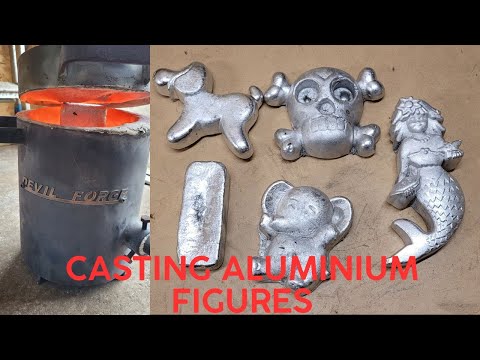The 6-Minute Rule for Stahl Specialty Company
The 6-Minute Rule for Stahl Specialty Company
Blog Article
Stahl Specialty Company - Truths
Table of ContentsThe Ultimate Guide To Stahl Specialty CompanyThe smart Trick of Stahl Specialty Company That Nobody is Talking AboutThe Main Principles Of Stahl Specialty Company Some Known Factual Statements About Stahl Specialty Company Not known Facts About Stahl Specialty Company
The subtle difference exists in the chemical web content. Chemical Comparison of Cast Aluminum Alloys Silicon promotes castability by reducing the alloy's melting temperature level and enhancing fluidness during spreading. It plays an essential duty in allowing detailed mold and mildews to be loaded precisely. Furthermore, silicon contributes to the alloy's toughness and wear resistance, making it beneficial in applications where toughness is crucial, such as automobile components and engine parts.It additionally boosts the machinability of the alloy, making it much easier to process right into completed products. This way, iron adds to the total workability of light weight aluminum alloys. Copper increases electrical conductivity, making it beneficial in electric applications. It additionally improves deterioration resistance and contributes to the alloy's total toughness.
Manganese contributes to the strength of aluminum alloys and boosts workability. It is typically utilized in wrought light weight aluminum items like sheets, extrusions, and profiles. The visibility of manganese help in the alloy's formability and resistance to cracking throughout manufacture processes. Magnesium is a lightweight aspect that supplies toughness and impact resistance to light weight aluminum alloys.
Zinc boosts the castability of light weight aluminum alloys and assists manage the solidification process throughout casting. It improves the alloy's stamina and solidity.
Some Known Questions About Stahl Specialty Company.
Since aluminum-silicon alloys have great spreading buildings, high gas properties, basic procedures, and outstanding deterioration resistance, aluminum-silicon alloys are most commonly used in the die-casting sector at home and abroad. At the very same time, aluminum-silicon alloys are also fairly early and widely recognized alloys developed and made use of in die-casting. After continuous research study and enhancement, the majority of the existing international mainstream aluminum-silicon alloys have been wrapped up and are absolutely nothing greater than A356, A360, A380, ADC12, B390, and A413.
The main thermal conductivity, tensile toughness, yield strength, and prolongation vary. Select appropriate raw products according to the performance of the target product produced. Amongst the above alloys, A356 has the highest thermal conductivity, and A380 and ADC12 have the least expensive. The tensile limitation is the opposite. A360 has the very best yield toughness and the highest prolongation price.

How Stahl Specialty Company can Save You Time, Stress, and Money.
In precision spreading, 6063 is appropriate for applications where detailed geometries and top notch surface area coatings are paramount. Instances consist of telecommunication enclosures, where the alloy's premium formability permits streamlined and cosmetically pleasing layouts while maintaining architectural honesty. In a similar way, in the Lighting Solutions industry, precision-cast 6063 components produce sophisticated and efficient lighting components that call for detailed forms and great thermal performance.
(https://www.figma.com/design/5dtta9biYAvurKhKjAAp7p/Untitled?node-id=0-1&t=AoovjzyjwBUdKG93-1)
It leads to a better surface area coating and better rust resistance in A360. Furthermore, the A360 displays superior elongation, making it suitable for facility and thin-walled parts. In precision spreading applications, A360 is well-suited for sectors such as Consumer Electronics, Telecommunication, and Power Tools. Foundry near me. Its enhanced fluidity permits detailed, high-precision parts like mobile phone casings and interaction device real estates.

In precision spreading, light weight aluminum 413 shines in the Consumer Electronics and Power Devices sectors. This alloy's remarkable deterioration resistance makes it a superb choice for outdoor applications, making certain resilient, long lasting items get more in the mentioned industries.
The Definitive Guide for Stahl Specialty Company
As soon as you have determined that the aluminum die casting process is ideal for your job, an important next action is making a decision on one of the most ideal alloy. The light weight aluminum alloy you choose will considerably influence both the casting process and the buildings of the end product. Due to this, you need to make your choice very carefully and take an informed strategy.
Identifying one of the most appropriate aluminum alloy for your application will certainly indicate evaluating a vast selection of characteristics. These relative alloy features follow the North American Pass Away Spreading Association's guidelines, and we've divided them right into two groups. Foundry. The first group addresses alloy qualities that influence the manufacturing process. The 2nd covers features influencing the properties of the last product.
The alloy you choose for die spreading straight impacts numerous aspects of the casting process, like how very easy the alloy is to function with and if it is susceptible to casting problems. Hot cracking, also referred to as solidification breaking, is a common die casting problem for light weight aluminum alloys that can result in inner or surface-level splits or fractures.
Get This Report about Stahl Specialty Company
Specific light weight aluminum alloys are extra susceptible to hot fracturing than others, and your selection should consider this. Another usual defect found in the die spreading of aluminum is die soldering, which is when the cast sticks to the die walls and makes ejection difficult. It can harm both the actors and the die, so you need to search for alloys with high anti-soldering residential properties.
Deterioration resistance, which is already a noteworthy attribute of aluminum, can differ substantially from alloy to alloy and is a necessary characteristic to consider relying on the environmental problems your product will certainly be exposed to. Wear resistance is another building frequently sought in light weight aluminum products and can separate some alloys.
Report this page